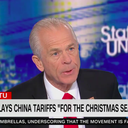Trump trade adviser Peter Navarro: Tariffs aren't hurting anyone in the U.S.

Published Date: 8/18/2019
Source: axios.com
White House trade adviser Peter Navarro said on CNN's "State of the Union" Sunday that tariffs on Chinese goods are not hurting consumers in the United States, despite reports to the contrary from researchers at Harvard, the University of Chicago, the International Monetary Fund, the Federal Reserve of Boston and more.JAKE TAPPER: "You and the administration keep saying the entire burden of these tariffs and this trade war is being bore by China. A study from researchers at Harvard, the University of Chicago, the IMF and the Federal Reserve of Boston in May found that U.S. importers are shouldering about 95% of the price change from tariffs, and China is shouldering only 5%. Are you saying their research is wrong?"NAVARRO: "You put on 10% tariffs on $200 billion. And China devalues its currency by 12%. Are consumers bearing anything on that? No. We have seen absolutely no evidence in the price data. It's not showing up in the consumer price index."TAPPER: "If these tariffs aren't hurting anyone in the United States --"NAVARRO: "They're not hurting anybody here."Why it matters: The Trump administration announced last week that the impending 10% tariffs on $300 billion worth of Chinese imports would be delayed from Sept. 1 to Dec. 15 for certain products. Trump and other aides explained that the delay is intended to help consumers who might be affected by tariffs during the holiday season — suggesting that the administration does, in fact, agree with experts that the trade war is harming Americans.Navarro said on CNN that business owners told Trump they had bought holiday goods in dollar-based contracts, meaning they had no ability to shift the tariff burden to China. He added that they promised Trump to move their supply chains out of China as fast as they can after the tariff delay."The president made a wise decision," Navarro said "Build goodwill with the Chinese, which protects consumers from any possible Christmas impacts. And once we get past that, these businesses are doing their contracts in a way that won't hurt consumers."Reality check: July's core consumer price index rose 0.3% from the previous month and 2.2% from a year earlier, meaning there has in fact been inflation, Bloomberg reports. Navarro also disputed that the yield curve had inverted earlier in the week, saying that it had merely flattened. This is not true.Yields on 10-year Treasuries on Wednesday fell briefly below yields on 2-year Treasuries, which fits the definition of an inverted yield curve. Navarro seems to argue that the inversion needed to be larger in order to be legitimate, but investors clearly disagreed — with the stock market on Wednesday falling 800 points in its worst day of 2019.The big picture: Navarro and White House economic adviser Larry Kudlow took to the Sunday morning talk shows in an effort to ward off public fears of an upcoming recession. The stock market saw a huge sell-off last week after the yield curve inversion, a warning sign that's predated every recession for the past 50 years.Navarro argued on ABC's "This Week" that "we're going to have a strong economy through 2020 and beyond with a bull market," predicting future rate cuts by the Federal Reserve, monetary easing by Europe and economic stimulus by China, and the potential passage of the U.S.-Mexico-Canada Agreement by Congress in the fall.Kudlow said on NBC's "Meet the Press": "Consumers are working at higher wages, they are spending at a rapid pace, they're actually saving also while they're spending. That's an ideal situation. So I think actually the second half of the economy is going to be very good in 2019. No I don't see a recession."Go deeper: Toymakers say Trump's China tariff delay "saved the holiday season"